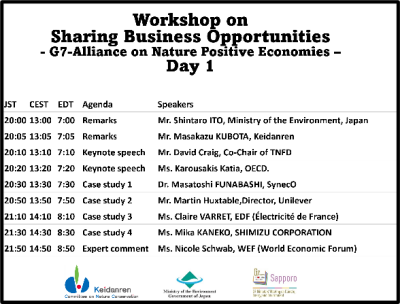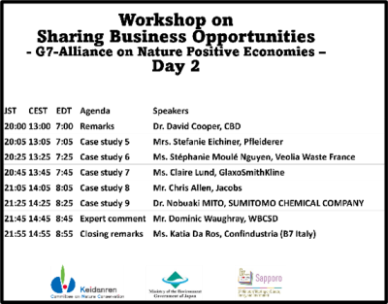G7 Alliance on Nature Positive Economies (G7ANPE)
Results of The G7 Alliance on Nature Positive Economies (G7 ANPE) International Workshop
Overview
With the aim of sharing knowledge and building network for nature positive economies, the workshop was organized by Keidanren (Keidanren Committee on Nature Conservation), co-organized by the G7 ANPE. During the workshop, speakers shared case studies on technology, products/services, business models that contribute to nature positive economies. Over the two-day event, more than 560 audiences in total from private companies, governments, research institutions, NPOs/NGOs, and other organizations participated in the workshop from all over the world.
Event date
Day 1: Wednesday, September 27, 2023
Day 2: Thursday, September 28, 2023
Modality: Online
Event date
Day 1: Wednesday, September 27, 2023
Day 2: Thursday, September 28, 2023
Modality: Online
Day 1
- Opening remarks 1: Mr. Shintaro Ito, Minister of the Environment, Japan
- Opening remarks 2: Mr. Masakazu Kubota, Keidanren Vice Chair and President
- Keynote speech 1: Mr. David Craig, Co-Chair, TNFD
- Keynote speech 2: Dr. Karousakis Katia, OECD Team Leader, Biodiversity, Climate, Biodiversity and Water Division
Case Study (Day 1)
Expert comment: Ms. Nicole Schwab, Co-Head, Nature-Based Solutions, WEF
After introducing the activities of each company and organization, Q&A sessions were held actively with the participants.
(1) Dr. Masatoshi Funahashi, SynecO
After introducing the activities of each company and organization, Q&A sessions were held actively with the participants.
(1) Dr. Masatoshi Funahashi, SynecO
He introduced the concept of Synecoculture, an agricultural method promoted by SynecO that promotes biodiversity. Synecoculture is a farming method that produces food by creating an ecologically optimal environment for a variety of plants without tillage, fertilizers, and chemical pesticides. It provided economic and social value to communities through the PoC in Burkina-Fasoand experiments in China, Ecuador and Japan.
(2) Mr. Martin Huxtable, Unilever
He explained Unilever's strategies including deforestation-free palm oil procurement, reforestation, sustainable raw material procurement, and switching to biodegradable materials by 2030, empowerment of producers and protection of production areas. He also pointed out the importance of actions/activities focused on impact.
(3) Ms. Claire VARRET, EDF
She shared EDF's commitment to improve biodiversity and lessons learnt from the materiality assessment of their business operations by EDF. She emphasized the necessity/importance of the third-party verification during the environmental impact assessment.
She shared EDF's commitment to improve biodiversity and lessons learnt from the materiality assessment of their business operations by EDF. She emphasized the necessity/importance of the third-party verification during the environmental impact assessment.
(4) Ms. Mika Kaneko, Shimizu Corporation
She shared the environmental vision of the Shimizu Corporation (Beyond Zero 2050) as well as opportunities and challenges for implementing green infrastructure that promotes biodiversity and sustainability. As their case, she introduced the concept of and efforts of UE-Net (Urban Ecological Network Evaluation system), which combines high-resolution satellite images and ecosystem evaluation.
She shared the environmental vision of the Shimizu Corporation (Beyond Zero 2050) as well as opportunities and challenges for implementing green infrastructure that promotes biodiversity and sustainability. As their case, she introduced the concept of and efforts of UE-Net (Urban Ecological Network Evaluation system), which combines high-resolution satellite images and ecosystem evaluation.
- Expert comment: Ms. Nicole Schwab, Co-Head, Nature-Based Solutions, WEF
Day 2
- Welcome remarks: Dr. David Cooper, Acting Executive Secretary, CBD
- He expressed his appreciation to the Japanese business community for their commitment. It was also emphasized that accelerating actions to realize improved biodiversity and nature positivity, with adoption of the Kunming-Montreal Global Biodiversity Framework as the first step.
Case Study (Day 2)
(1) Dr. Stefanie Eichner, Pfleiderer
She introduced initiative named Ubi supported by German government (knowledge sharing and biodiversity strategy to encourage German companies and business organizations to raise awareness and strengthen their commitment to biodiversity). In addition to providing an overview of Pfleiderer's initiatives to strengthen its supply chain, she also introduced Pfleiderer's efforts to realize a circular economy and the setting of targets for sustainability assessments.
She introduced initiative named Ubi supported by German government (knowledge sharing and biodiversity strategy to encourage German companies and business organizations to raise awareness and strengthen their commitment to biodiversity). In addition to providing an overview of Pfleiderer's initiatives to strengthen its supply chain, she also introduced Pfleiderer's efforts to realize a circular economy and the setting of targets for sustainability assessments.
(2) Ms. Stéphanie Moulé Nguyen Veolia
Veolia conducts business with the aim of ecological transformation, achieving both human progress and environmental protection. She introduced the formulation of environmental strategies for waste treatment, and the approach of environmental analysis that is the core of this strategy.
Veolia conducts business with the aim of ecological transformation, achieving both human progress and environmental protection. She introduced the formulation of environmental strategies for waste treatment, and the approach of environmental analysis that is the core of this strategy.
(3) Ms. Claire Lund GSK
She explained the targets for the company's environment and sustainability, in addition to GSK's approach which is to set science-based goals for environment. It was also suggested ways for private companies and governments to collaborate, including providing policy objectives and legal frameworks, creating opportunities to share best practices, and clarifying the role of companies in the development of strategies and plans for biodiversity.
She explained the targets for the company's environment and sustainability, in addition to GSK's approach which is to set science-based goals for environment. It was also suggested ways for private companies and governments to collaborate, including providing policy objectives and legal frameworks, creating opportunities to share best practices, and clarifying the role of companies in the development of strategies and plans for biodiversity.
(4) Mr. Chris Allen, Jacobs
He introduced PlanBeyond2.0 which is Jacobs' sustainable business approach, and the roadmap for nature positive infrastructure and architecture. Cases of the company's activities were shared, including responding to climate change, protection of biodiversity and natural ecosystems in the development of infrastructure and real estate.
He introduced PlanBeyond2.0 which is Jacobs' sustainable business approach, and the roadmap for nature positive infrastructure and architecture. Cases of the company's activities were shared, including responding to climate change, protection of biodiversity and natural ecosystems in the development of infrastructure and real estate.
(5) Dr. Nobuaki Mito, Sumitomo Chemical
He explained that Sumitomo Chemical's green transformation was applied not only to carbon neutrality, but also to the context of solving a wide range of social issues, such as protecting ecosystems and promoting human health. As an example of a nature positive approach was shared. The product using Arbuscular Mycorrhizal Fungi (AMF) have various effects such as soil improvement and efficient use of soil nutrients that also contribute nature positive.
He explained that Sumitomo Chemical's green transformation was applied not only to carbon neutrality, but also to the context of solving a wide range of social issues, such as protecting ecosystems and promoting human health. As an example of a nature positive approach was shared. The product using Arbuscular Mycorrhizal Fungi (AMF) have various effects such as soil improvement and efficient use of soil nutrients that also contribute nature positive.
- Expert Comments:
- Mr. Dominic Waughray, Executive Vice President, WBCSD He summarized the day 2 case studies. WBCSD provides companies with roadmaps and guidance towards nature positive economies, which serves as the basis for actions in various sectors such as food and agriculture systems, energy and forestry.
- Announcement:
- The G7ANPE Secretariat invited non-G7 governments, companies, research institutions, NGOs/NPOs to participate in the G7ANPE Alliance and introduced renewing the website “Business for GBF Project” which was created for dissemination of Japanese companies’ contribution to Nature Positive Economy.
- Closing remarks:
- Ms Katia Da Ros, Vice President for Environment, Sustainability and Culture, Confindustria (B7 Italy) She expressed her gratitude to the participants, speakers, and organizers. She emphasized that every stakeholder including business, civil society, and policy makers was required to take actions toward nature positive economies, and they needed to work together to address the various challenges to realizing nature positive economies.
Workshop video
A recording of the workshop is available on youtube.
【Day1】 【Day2】


※For Japanese version, please refer to the following link
https://www.env.go.jp/nature/business/index_00001.html
